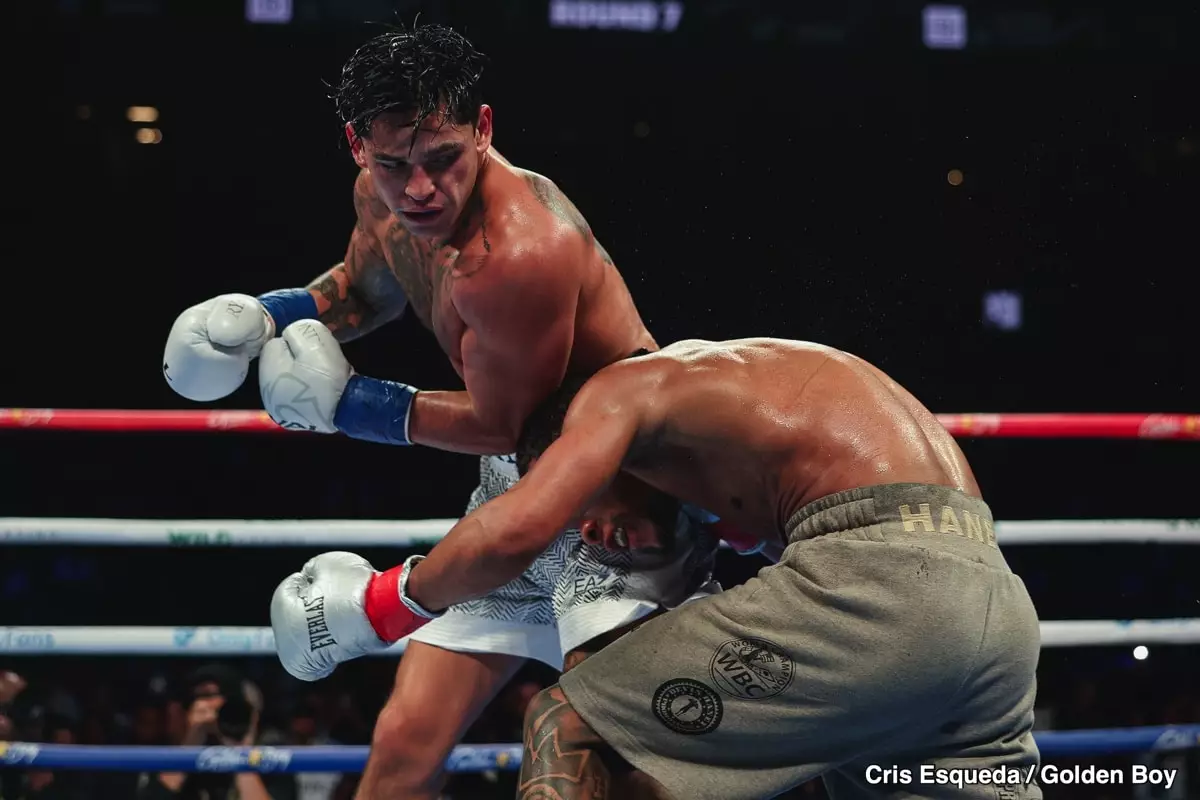In the volatile realm of professional boxing, the aftermath of a defeat can shape a fighter’s reputation and career trajectory considerably. Recently, Devin Haney’s journey took a controversial turn following his loss to Ryan Garcia on April 20. This defeat, accompanied by allegations regarding the positive test for performance-enhancing drugs (PEDs), has resulted in Haney choosing to sue Garcia over battery, fraud, and unjust enrichment. The reactions from fans and boxing analysts alike reveal a troubling narrative: Haney’s public persona is suffering immensely. Chris Algieri, a former world champion and notable commentator, discusses the potential ramifications of Haney’s decisions—not just for his reputation, but for his financial future as well.
Haney’s lawsuit has not merely floated under the radar; it has ignited a firestorm of criticism on social media platforms like X (formerly known as Twitter). Fans are quick to express discontent, suggesting that legal action post-defeat reveals a weakness in character. This sentiment is compounded by Algieri’s assertion that Haney will continue to face scrutiny until he steps back into the ring and proves himself with solid wins. Indeed, it may have been more prudent for Haney to let cooler heads prevail and focus on rebuilding his career through victories, rather than engaging in a legal battle that many perceive as a desperate move.
The perceptions fans hold have significant implications. Haney’s move to welterweight only adds to the skepticism around his ability to compete effectively.
The question now arises: who can Haney realistically compete against in the welterweight class given his current trajectory? Names like Jaron Ennis and Brian Norman Jr. spring to mind as formidable opponents—fighters who not only mix skill with power but also possess an air of invincibility that makes it difficult to see Haney as a legitimate contender. As Algieri points out, unless Haney can reinvigorate his image through spectacular performances, his clamp on wealth and title contention will likely slip away.
Those who admired Haney’s potential as a fighter now find themselves drowning in doubt, unable to see him emerging victorious against top-tier competition. The stark reality is that entering the ring with a weak image is a tactical disadvantage that can turn champions into mere contenders.
Ryan Garcia’s unabashed confidence also plays a crucial role in framing the context for Haney. Garcia openly stated that he would defeat Haney continually, asserting that defeat is not merely a possibility but an inevitability. While confidence can be a double-edged sword, in Garcia’s case, it serves to reinforce his standing as a rising star compared to Haney’s embattled reputation. Moreover, the manner in which Garcia nullified Haney’s defenses during their fight calls into question Haney’s strategic acumen and his ability to adapt under pressure.
Garcia’s assertion that Haney struggles with “punch resistance” subtly cuts to the heart of the matter, posing a significant tactical concern for Haney should a rematch occur. The wrestling landscape of boxing is littered with fighters who experience meteorological shifts in their careers; however, Haney’s trajectory may be pushing him away from the limelight unless he can turn the tide through sheer determination and prowess in subsequent fights.
Algieri’s comments extend beyond mere fan reaction and into the financial consequences faced by Haney. The purse bid results following the lawsuit reveal a stark truth: without the backing of a promoter or the fanfare of successful performances, Haney’s financial viability has significantly diminished. The mere $2.4 million bid for his upcoming fight against Sandor Martin showcases just how fast the tide can turn in boxing. Unlike before, when lucrative purses were a given for his profile, Haney now finds himself stepping out with a dwindling reputation and diminished dollars.
The discussion of a unified commission also deserves consideration. In an era rife with scandals surrounding both PEDs and weight regulation, the presence of a governing body with real authority could perhaps mitigate some of these issues. Nonetheless, the die may already be cast for Haney, as he must navigate a minefield of both personal and professional repercussions stemming from this recent fallout.
As the dust settles on Haney’s legal maneuverings and criticisms from every corner of the boxing community mount, one thing remains clear: it’s now imperative for Haney to return to the ring, silence the detractors, and reshape his legacy. Winning over notable opponents may be the only way to restore his credibility, image, and marketability. The boxing world is unforgiving; redemption is fought for, not given. In the coming months, Haney’s actions will be scrutinized closely, as fans and analysts alike eagerly await to see if he can reclaim his status in a sport that thrives on resilience and tenacity.

